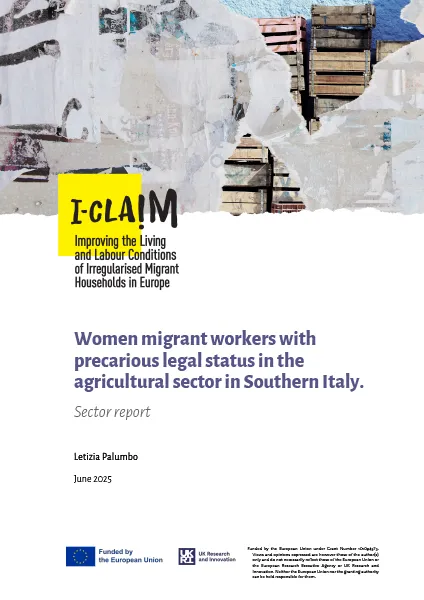Women migrant workers with precarious legal status in the agricultural sector in Southern Italy
Letizia Palumbo
How to cite:
Palumbo, L. (2025) Women migrant workers with precarious legal status in the agricultural sector in Southern Italy. I-CLAIM. DOI: 10.5281/zenodo.15833919
Women migrant workers with precarious legal status in the agricultural sector in Southern Italy
Letizia Palumbo
This country report, developed within the framework of the I-CLAIM project, explores the living and working conditions of migrant women employed in the agricultural sector of southern Italy, with a specific focus on rural areas in the provinces of Naples and Caserta in the Campania region. Drawing on extensive ethnographic fieldwork carried out between February 2024 and April 2025, the report examines how legal precarity, undeclared work and gender-based exploitation intersect to shape the daily lives of these women.
Most of the participants, mainly from Ukraine, have experienced transitions between regular and irregular legal statuses, often finding themselves in a state of uncertainty and vulnerability that affects not only their employment, but also their living conditions. Agricultural work is mainly undeclared and underpaid. Even when workers have valid residence permits, their employment is often irregular or only partially declared. This grey zone of labour relations contributes to persistent irregular work and exploitation. Many women report low wages, strenuous work patterns and poor safety conditions, including exposure to aggressive chemicals and a lack of toilets. Gendered dynamics further exacerbate this situation: women typically face sexist attitudes and, in some cases, sexual harassment in workplaces. In this context, undocumented status drastically reduces bargaining power and increases vulnerability to abuse.
The report argues that this is “poor work”, which only just allows workers to meet the bare minimum standards for a dignified life. Despite working all week, many women struggle to pay their rent, buy groceries and cover their children’s expenses. Their precarious legal status often hinders their access to benefits such as family allowances.
Beyond the workplace, many female farm workers face precarious housing conditions — substandard buildings in urban areas far from the fields where they work, with limited transport options. Even though they live in urban areas, the lack of public transport and connections – for example, in Mondragone the nearest train station is eight km. from the town centre – places these workers in a situation of spatial isolation and immobility.
The lack of public services and affordable childcare, combined with demanding work schedules and the absence of family networks, places a disproportionate burden on women, who are almost always solely responsible for care work at home. Many rely on informal childcare arrangements. The report highlights how language barriers, social isolation and discrimination based on their foreignness reinforce their marginalisation. Not only do time constraints prevent women from participating in trade union or community spaces, but a widespread sense of disillusionment also plays a role.
In this context, exploitation is not confined to the workplace, but extends to every area of daily life, influencing how these women live, move and interact with others. The report emphasises the invasive nature of exploitation, which extends beyond the workplace to encompass all areas of life, thereby compressing its essential spheres.
The report calls for a structural, intersectional and gender-sensitive response to irregularity and labour exploitation in agriculture. Addressing these challenges requires integrated action on migration policy, labour rights, housing, transport and welfare, as well as a shift away from emergency-driven interventions towards long-term, inclusive strategies that prioritise the rights and agency of migrant women.
